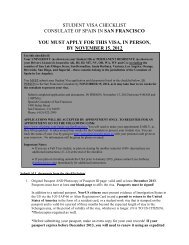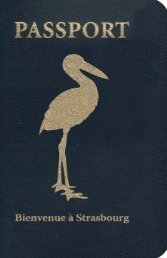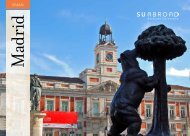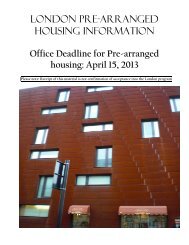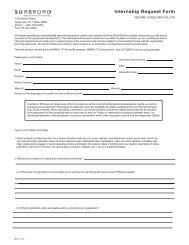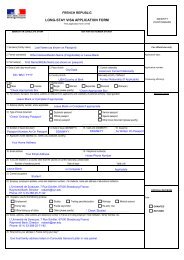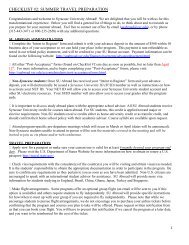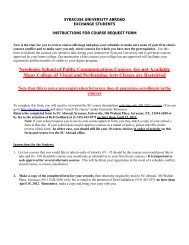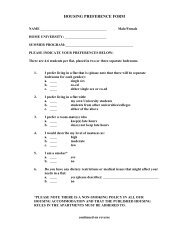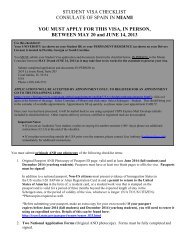PREPARING TO GO - SU Abroad - Syracuse University
PREPARING TO GO - SU Abroad - Syracuse University
PREPARING TO GO - SU Abroad - Syracuse University
You also want an ePaper? Increase the reach of your titles
YUMPU automatically turns print PDFs into web optimized ePapers that Google loves.
<strong>PREPARING</strong> <strong>TO</strong> <strong>GO</strong><br />
Strasbourg, France: Fall 2011<br />
Important things to do and think about before<br />
you embark on your semester in Strasbourg<br />
106 Walnut Place, <strong>Syracuse</strong>, NY 13244<br />
Phone: 1.800.235.3472<br />
Fax: 315.443.4593<br />
suabroad@syr.edu<br />
suabroad.syr.edu
CONTENTS<br />
A message from the executive director of <strong>SU</strong> <strong>Abroad</strong> .................................................. 2<br />
Program contact information ........................................................................................... 3<br />
Visa applications ................................................................................................................ 4<br />
Packing your bags ............................................................................................................. 5<br />
Pre-semester seminar …………………………………………………………………... 6<br />
Living in Strasbourg ....................................................................................................... 7<br />
• Housing and facilities<br />
• Transportation<br />
• Computer/technology information<br />
• Keeping in touch<br />
• Work-study<br />
Health and safety information ........................................................................................ 10<br />
• Health and accident insurance<br />
• Personal property insurance<br />
• International Student I.D. Card (ISIC)<br />
• International SOS<br />
• Prescription medication<br />
• Code of conduct<br />
Financial information ...................................................................................................... 13<br />
• Tuition, program fees, and course fees<br />
• Financial aid<br />
• Refunds and work-study funds<br />
• Expenses<br />
• Budgeting<br />
• Banking<br />
Course information ......................................................................................................... 18<br />
Program calendar ........................................................................................................... 19<br />
Global Ambassadors/student peer advisors .................................................................. 21<br />
Preparing to Go: Strasbourg – Fall 2011<br />
1
A MESSAGE FROM THE EXECUTIVE DIREC<strong>TO</strong>R OF <strong>SU</strong> ABROAD<br />
Dear student,<br />
Welcome to <strong>Syracuse</strong> <strong>University</strong> <strong>Abroad</strong>! Students have told us that<br />
nothing is more special during their college years than studying abroad<br />
for a summer, semester, or year. You will begin by seeing and judging<br />
everything by the values with which you have grown up. You’ll return<br />
with a different set of values: a blend of who you were and the<br />
international person you have become.<br />
Studying abroad means laughing at yourself sometimes. Along with its<br />
challenges, you’ll also find that the flexibility and courage<br />
you demonstrate will provide lasting rewards. Professionally<br />
and personally, you will become a true citizen of the world.<br />
We have designed this Preparing to Go booklet to help you prepare for<br />
study abroad. It is a country-specific supplement to the information for accepted students on our<br />
website, suabroad.syr.edu. Please refer to the website for important information about <strong>SU</strong><br />
<strong>Abroad</strong> policies and procedures. Your parents will receive their own copy so they know what’s<br />
going on as you prepare to go and after you arrive abroad.<br />
We are very pleased you have chosen <strong>SU</strong> <strong>Abroad</strong>. Our overseas directors and partners across the<br />
globe look forward to welcoming you soon to your host country.<br />
Sincerely,<br />
Jon V. C. Booth<br />
Executive director<br />
Preparing to Go: Strasbourg – Fall 2011<br />
2
PROGRAM CONTACT INFORMATION<br />
In Strasbourg, the <strong>SU</strong> center mailing address is:<br />
Université de <strong>Syracuse</strong><br />
7 rue Schiller<br />
67000 Strasbourg, France<br />
To contact the <strong>SU</strong> center from the United States:<br />
tel: (011) 33-388-25-71-92<br />
fax: (011) 33-388-35-51-63<br />
Become a fan of <strong>Syracuse</strong> <strong>University</strong> Strasbourg on Facebook!<br />
Important contact information for staff in Strasbourg:<br />
Raymond Bach, director, bach.raymond@syracuse-france.fr<br />
Jean-Maurice Marxer, assistant director /academic prog, marxer.jm@syracuse-france.fr<br />
Sabrina Barel, student services/receptionist, barel.sabrina@syracuse-france.fr<br />
Alison Bayart, assistant to director, bayart.allison@syracuse-france.fr<br />
Mick Hardenberg, housing and field placements coordinator,<br />
hardenberg.mick@syracuse-france.fr<br />
Mail should be sent to your attention at your center’s address. For example:<br />
ATTN: Your name<br />
Université de <strong>Syracuse</strong><br />
7 rue Schiller<br />
67000 Strasbourg<br />
France<br />
Before shipping, review our website for important tips on mailing packages overseas:<br />
http://suabroad.syr.edu/acceptedstudents/packing/shippingandstorage.html<br />
Preparing to Go: Strasbourg – Fall 2011<br />
3
VISA APPLICATIONS<br />
You will need a visa for your semester or year in Strasbourg. A visa is a document that<br />
gives you permission to travel to a specific country for a set period of time. The visa is<br />
issued by the embassy or consulate of country you’re visiting, and you must complete the<br />
application process correctly and by the deadline. Failure to do so can delay your travel,<br />
or worse, prevent you from entering the country. The process for obtaining a visa for<br />
France can be lengthy, so it is important to start the application process immediately. You<br />
will probably have to submit your visa application in person to the French consulate<br />
serving your home jurisdiction. Be sure to visit the <strong>SU</strong> <strong>Abroad</strong> Strasbourg visa<br />
information website: suabroad.syr.edu.<br />
<strong>SU</strong> <strong>Abroad</strong> will also send you a separate e-mail and mailing with detailed information on<br />
how to obtain a French visa.<br />
For questions related to French visas contact Julie Riverso at 315-443-3471 or via e-mail<br />
at jurivers@syr.edu.<br />
When you arrive in Strasbourg, Madame Barel, who is in charge of student services, will<br />
assist you in completing the part of the visa process that needs to be done in France. This<br />
will involve some paperwork, a visit to a government-authorized doctor, and a payment<br />
of approximately 55 Euros.<br />
Preparing to Go: Strasbourg – Fall 2011<br />
4
PACKING YOUR BAGS<br />
General advice<br />
You can read helpful information about Strasbourg at suabroad.syr.edu. Remember to<br />
take arrival information, seminar materials, and calendars with you.<br />
For now, here are a few general suggestions about packing:<br />
• Take half of what you think you need. Many airlines have strict regulations<br />
regarding baggage weight limits and you may be charged for any excess weight.<br />
• You must be able to carry your own luggage. Porters are seldom, if ever, available<br />
abroad and you cannot always count on finding a luggage cart. Don’t load yourself<br />
down.<br />
• Do not pack valuables in your checked suitcases. Luggage can occasionally get<br />
lost, so make sure your travel documents, money, medication, laptop, and other<br />
important items are packed in your carry-on bag.<br />
• Check with your airline about specific luggage requirements, including carry-on<br />
restrictions.<br />
• Currently, three-ounce containers of liquids and gels (packed in a one-quart<br />
transparent plastic bag) are the maximum allowed in your carry-on luggage.<br />
• Do not bring scissors or sharp objects in carry-on luggage.<br />
• As security protocols are subject to change, confirm airline regulations for luggage<br />
and carry-on restrictions before leaving for the airport.<br />
Packing for the European Identity seminar<br />
Pack everything you will need for the European Identity Signature Seminar in one bag.<br />
Keep your valuables and any items that you will need for the first couple of days of the<br />
seminar in your carry-on luggage in case your suitcases are delayed due to flight<br />
connections. Your other bag(s) will be sent by truck to Strasbourg. Since you will be<br />
traveling by bus, we recommend that your orientation/seminar suitcase be of moderate<br />
size and weight.<br />
Note: For independent weekend travel during the remainder of the semester you may<br />
want to bring a small backpack.<br />
Preparing to Go: Strasbourg – Fall 2011<br />
5
PRE-SEMESTER SEMINAR<br />
Monday to Thursday, August 22-25 (3 nights)<br />
Hotel Transit<br />
Hagelberger Strasse 53-54<br />
10965 Berlin, Germany<br />
Tel: 011 49 30 789 0470<br />
Fax: 011 49 30 789 04777<br />
Thursday to Sunday, August 25-28 (3 nights)<br />
Hotel Tumski<br />
Wyspa Slodowa 10<br />
50-266 Wroclaw, Poland<br />
Tel: 011 48 71 322 6099<br />
Fax: 011 48 71 322 6113<br />
Sunday to Monday, August 28-29 (1 night)<br />
Hotel Continental<br />
Kounicova 6<br />
602 00 Brno, Czech Republic<br />
Tel: 011 420 5 4151 9305<br />
Fax: 011 420 5 4121 1203<br />
Field study seminar hotels<br />
FALL 2011 as of 2/9/11<br />
Monday to Thursday, August 29-September 1 (3 nights)<br />
Atlas Hotel - Vienna<br />
Lerchenfelderstrasse 1-3<br />
1070 Vienna, Austria<br />
Tel: 011 43 1 524 20 40<br />
Fax: 011 43 1 524 20 40 222<br />
Thursday to Friday, September 1-2 (1 night)<br />
Jungendherberge Regensburg<br />
Wöhrdstr. 60<br />
93059 Regensburg, Germany<br />
Tel: 011 49 941 57402<br />
Fax: 011 49 941 52411<br />
Preparing to Go: Strasbourg – Fall 2011<br />
6
LIVING IN STRASBOURG<br />
Housing and facilities<br />
Meals<br />
In Strasbourg, you will live with a host family who will provide you with breakfast seven<br />
days a week and an evening dinner five days a week. The Friday meal may be replaced<br />
with a Sunday evening meal by mutual agreement between you and your host. You are<br />
responsible for your other meals during the program period. We estimate this cost at<br />
$1,780 to $1,925 per semester.<br />
Vacations<br />
You will be expected to leave your host’s home for the mid-semester break, just as you<br />
leave your dorms when on your home campus.<br />
Option II and III students<br />
As you will be studying at the Université de Strasbourg, you will remain in Strasbourg a<br />
few days longer than Option I students.<br />
NOTE: You may not host overnight guests at your host home. Visiting friends and family<br />
should make hotel reservations.<br />
Transportation<br />
As part of your program fee, you will receive a monthly bus/tram pass, which permits<br />
unlimited travel on the CTS network. The <strong>SU</strong> center purchases the pass for the first<br />
month and then gives you a cash allowance to renew your passes for the rest of the<br />
semester. You are responsible, however, for any travel costs after public transportation<br />
ceases to run (e.g. taxi fare to return home after a late social activity).<br />
Bus and tram transportation<br />
Strasbourg has an outstanding public transit system, the CTS (www.cts-strasbourg.fr).<br />
From Monday to Saturday buses and trams run frequently from early in the morning to<br />
approximately 12:30 a.m. For late-night travel, there are special bus lines. On Sundays<br />
and holidays, trams and buses run on a more limited schedule.<br />
Taxis<br />
In France, customers do not flag down taxis in the street. Instead, they either call to have<br />
one pick them up or they wait at a taxi stand. Taxi stands can be found at the train station,<br />
the Council of Europe, the Place Arnold, and many other points around the city. To keep<br />
your expenses down, use taxis in moderation.<br />
Driving abroad<br />
You should not own, rent, or operate any type of motor vehicle abroad. Driving<br />
Preparing to Go: Strasbourg – Fall 2011<br />
7
egulations and habits in many countries abroad are different from those in the United<br />
States, and driving overseas can be frustrating and potentially dangerous. Your family’s<br />
liability insurance may not be valid overseas.<br />
Computer/technology information<br />
Computers are available in the Strasbourg center during its regular hours:<br />
Monday to Thursday 8:00 a.m. to 7:00 p.m.<br />
Friday<br />
8:00 a.m. to 6:00 p.m.<br />
The Internet computer room (003) in the basement contains:<br />
• Six PCs with Internet access and one printer<br />
• Three PCs for quick e-mail and one printer<br />
• Six cables for connecting laptops to the Internet and printers<br />
• Wireless access<br />
The third-floor room (304) contains:<br />
• Three PCs with Internet access and one printer<br />
• Four connecting cables for laptops<br />
• Wireless access<br />
Personal laptops<br />
For general computer connections, you must ensure that your computer will work on<br />
220/240-volt, 50-cycle current. Since nearly all laptops work on 100- to 240-volts, 50/60-<br />
cycle current, you will likely need a plug adapter. These are available from most<br />
electronics stores (e.g. Radio Shack, CompUSA, Apple stores, etc.).<br />
· At the Strasbourg center: The center has cables you can use to connect your laptops<br />
to the Internet and wireless access in certain parts of the building.<br />
· At home: Nearly all host families have Internet access.<br />
· Additional Internet access: Several local cafés provide wireless access to their<br />
customers.<br />
Keeping in touch<br />
Most students purchase cell phones during their stay in Strasbourg. Further information will be<br />
given out during orientation.<br />
Snail mail<br />
France has some of the world’s most beautiful stamps, so be sure to ask for “timbres de<br />
collection” and not just ordinary stamps when you go to the post office.<br />
Preparing to Go: Strasbourg – Fall 2011<br />
8
E-mail<br />
The <strong>SU</strong> Strasbourg center has a computer lab and wireless access in certain areas of the<br />
building.<br />
Work study/internships<br />
Internships<br />
Requests for internships will be reviewed by our staff in Strasbourg once you submit the<br />
internship request form and your résumé. While we cannot guarantee a specific<br />
placement, we attempt to find a suitable match between your background and interests<br />
and an available position. All placements are subject to an on-site interview overseas and<br />
cannot be finalized until after you arrive in Strasbourg. If you intend for an internship<br />
to meet a degree requirement, you should discuss this with your home college or<br />
major advisor before you go abroad. Note that approval for internship credit is based<br />
on the proposal you submit once your internship is finalized in Strasbourg. This form is<br />
subject to review by the appropriate academic department and your home school or<br />
college (non-<strong>Syracuse</strong> students’ forms are reviewed at <strong>SU</strong> <strong>Abroad</strong> after receiving<br />
departmental approval). Some internships may be registered under the non-departmental<br />
rubric IPA (International Internship <strong>Abroad</strong>). Most internship placements are registered<br />
for 1 to 3 credits (depending on hours fulfilled on-site and on departmental and/or home<br />
school policy).<br />
Independent study<br />
Requests to take an independent study must be approved by May 15. Independent study<br />
requests are usually approved only when it is necessary to meet a degree requirement that<br />
cannot be fulfilled by a Strasbourg course offering and to stay on track for graduation.<br />
Also, an appropriate faculty sponsor and research materials must be available in<br />
Strasbourg. To begin the approval process, contact Jackie Lewis-Frenay at<br />
jdlewis@syr.edu or 1-800-235-3472.<br />
Preparing to Go: Strasbourg – Fall 2011<br />
9
HEALTH AND SAFETY INFORMATION<br />
The following is a brief overview of important information regarding health and safety<br />
while abroad. For more detailed information, review the “Health and Safety” section of<br />
suabroad.syr.edu.<br />
Health and accident insurance<br />
You must be covered by comprehensive health and accident insurance for the duration of<br />
your program. In many cases, you will be required to provide proof of insurance in order<br />
to receive a student visa or residency permit. We recommend that you review the<br />
following issues with your parents and with your parents’ insurance provider.<br />
• Health care is often just as expensive overseas as it is in the United States, so make sure<br />
you have the same amount of coverage abroad as you would in the United States. Check<br />
with your health insurance provider to see if you will be covered overseas. If so, you will<br />
likely need to pay out of pocket for doctor appointments, then work with your health<br />
insurance company to get reimbursed.<br />
• If you are not insured under a family policy or a campus policy that provides for<br />
overseas protection, you should enroll in an insurance plan designed for Americans living<br />
overseas. Contact our authorized insurance agent, Haylor, Freyer & Coon<br />
(1-800-289-1501 or http://www.haylor.com).<br />
• If you have pre-existing conditions that short-term policies will not cover, such as<br />
asthma or diabetes, it may be possible to add a rider for overseas protection to<br />
your parents’ policy. Check your parents’ health insurance policy.<br />
Personal property insurance<br />
To protect your possessions against fire, theft, and vandalism, you may want to<br />
consult your parents’ homeowners insurance. You may already be covered under their<br />
plans. However, in some cases you may want to consider purchasing short-term personal<br />
property insurance designed for students living overseas. Short-term insurance can be<br />
purchased through our authorized agents, Haylor, Freyer & Coon. If you would like more<br />
information, contact HF&C at 1-800-289-1501.<br />
Important note: <strong>SU</strong> <strong>Abroad</strong> is not responsible for items that are lost, stolen, or damaged<br />
abroad. Make sure your valuables are covered by insurance.<br />
Limited Insurance Coverage with the International Student I.D. Card (ISIC)<br />
<strong>Syracuse</strong> <strong>University</strong> <strong>Abroad</strong> provides limited insurance coverage to program participants<br />
with the International Student I.D. Card (ISIC). This coverage is supplemental to your<br />
own insurance coverage. The cost of the ISIC card is included in your program fee. For<br />
more information on the ISIC card, visit http://www.myISIC.com. You will receive your<br />
ISIC card upon arrival in your host country.<br />
10<br />
Preparing to Go: Strasbourg – Fall 2011
International SOS<br />
<strong>Syracuse</strong> <strong>University</strong> is an institutional member of International SOS (ISOS), which for<br />
many years, has provided the best available emergency medical services for military<br />
personnel, U.S. government officials and staff, and other worldwide organizations and<br />
corporations. This membership extends to you when you travel or live abroad as a<br />
participant of an <strong>SU</strong> <strong>Abroad</strong> program and includes a full range of medical and countryspecific<br />
information, referrals, and emergency services 24 hours a day.<br />
Use the <strong>SU</strong> membership number on the front of your card to access the ISOS website<br />
before you go abroad (http://www.internationalsos.com). You can register your health<br />
records and medical history, find a network of physicians, specialists, hospitals, and<br />
specific medical recommendations for cities all over the world. Sign and carry the card<br />
with you. Your parents should record the membership number and website so they also<br />
have access. <strong>SU</strong> <strong>Abroad</strong> will mail your ISOS cards prior to your departure.<br />
Here is a brief overview of the most important program features:<br />
• As a member, you have access to ISOS information services at no charge. These<br />
information services include information (including country risk ratings, State<br />
Department postings, medical travel recommendations, and immunization<br />
requirements), access to doctors via phone consultation, referrals to Englishspeaking<br />
doctors, care assessment, and translation services in case of<br />
hospitalization.<br />
• While you have access to ISOS clinics and doctors around the world, delivery of<br />
such services must be covered by you and/or your health insurance policy.<br />
Important note: The use of actual medical services (beyond information services) is not<br />
free. The ISOS program and membership is not an insurance plan. You are still required<br />
to have health insurance that covers you abroad.<br />
Prescription medication<br />
If you regularly take prescription medication bring enough for the entire term. In<br />
addition, ask your doctor for a generic breakdown (not just a generic name) of your<br />
prescription, so you can refill your prescription overseas if necessary. Bring a letter from<br />
your doctor to present to customs officials if you are carrying medication.<br />
DO NOT EXPECT <strong>TO</strong> RECEIVE PRESCRIPTION MEDICATION BY MAIL. If<br />
you must refill a prescription while abroad, check with your physician or consult the<br />
center staff for a physician referral on obtaining an equivalent generic prescription<br />
overseas. If you must receive medication by mail, check with the consulate for your host<br />
country about the legality of receiving your medication abroad. The consulate should also<br />
be able to inform you of the proper documentation, such as a physician’s prescription,<br />
Preparing to Go: Strasbourg – Fall 2011<br />
11
necessary for shipment. The Electronic Embassy (http://www.embassy.org) has direct<br />
links to the websites of all the embassies of our host countries.<br />
Code of Conduct<br />
<strong>Syracuse</strong> <strong>University</strong> Code of Conduct and the <strong>SU</strong> <strong>Abroad</strong> Standards of Behavior<br />
<strong>SU</strong> <strong>Abroad</strong> is committed to your health and safety while studying abroad. You must be in<br />
good disciplinary standing with your home university to be eligible to study abroad and<br />
must maintain this standing through your term overseas.<br />
<strong>SU</strong> <strong>Abroad</strong> participants are held accountable to the <strong>Syracuse</strong> <strong>University</strong> Statement of<br />
Student Rights and Responsibilities, the Code of Student Conduct and the <strong>SU</strong> <strong>Abroad</strong><br />
Standards of Behavior while overseas. For more detailed information on these policies,<br />
review the “accepted students” and “policies” sections of suabroad.syr.edu.<br />
Preparing to Go: Strasbourg – Fall 2011<br />
12
FINANCIAL INFORMATION<br />
Program expenses<br />
Program fee<br />
The program fee for Strasbourg includes:<br />
• The pre-departure meetings<br />
• The European Identity Signature Seminar (see below)<br />
• Orientation in Strasbourg<br />
• Selected cultural activities in Strasbourg<br />
• Housing in private homes<br />
• 12 meals weekly (seven breakfasts and five dinners)<br />
• All-school field trips and events such as “Family Night,” “Farewell Banquet,” etc.<br />
• International Student I.D.<br />
• Bus/tram pass<br />
• Registration at the <strong>University</strong> of Strasbourg Sports Center<br />
European Identity Signature Seminar<br />
The costs covered include:<br />
• Inter-city transportation on a private bus<br />
• Entry fees, guided tours, and group activities<br />
• Accommodations in hotels and hostels<br />
• Breakfast every morning<br />
• Three group meals<br />
You should budget approximately $400 for the other meals during the seminar. Do NOT<br />
bring large amounts of cash!<br />
Financial aid<br />
Transferring your financial aid from your home institution<br />
(Non-<strong>SU</strong> students only. This information does NOT apply to students from direct-billed<br />
schools.)<br />
If you are matriculated at a university or college other than <strong>SU</strong> and are currently<br />
receiving federal financial aid, confirm that the aid will continue while you are studying<br />
abroad. The first step is to contact the financial aid office at your home school to<br />
determine if your school will process financial aid for your enrollment in an <strong>SU</strong> <strong>Abroad</strong><br />
program.<br />
If your home college has policies that preclude them from processing financial aid for<br />
you at <strong>Syracuse</strong> <strong>University</strong>, you may be eligible for federal financial aid through<br />
<strong>Syracuse</strong> <strong>University</strong>, but only if your home college agrees to sign a Consortium<br />
Preparing to Go: Strasbourg – Fall 2011<br />
13
Agreement with <strong>Syracuse</strong> <strong>University</strong>. See the detailed instructions for these options<br />
below:<br />
1. Home school processes your financial aid<br />
• Complete the financial aid transfer form (suabroad.syr.edu)<br />
• Return it to <strong>SU</strong> <strong>Abroad</strong> with a copy of your school’s Consortium Agreement<br />
Your home school may enter into a Consortium Agreement with <strong>Syracuse</strong><br />
<strong>University</strong> in which they agree to process your financial aid for your study<br />
abroad program. Your home school should forward a copy of its own<br />
Consortium Agreement to our office. Under this arrangement, your school will<br />
process your financial aid as if you were still enrolled at your home campus.<br />
To arrange for the transfer of your financial aid to <strong>SU</strong>, we require your home<br />
school financial aid official and Bursar complete the financial aid transfer<br />
form at suabroad.syr.edu under “Cost and Aid.” Be aware that with this type of<br />
agreement you will receive a billing statement directly from <strong>Syracuse</strong><br />
<strong>University</strong>.<br />
-or-<br />
2. <strong>Syracuse</strong> <strong>University</strong> processes your financial aid<br />
• Documents at suabroad.syr.edu<br />
If your home school will not process your financial aid, <strong>Syracuse</strong><br />
<strong>University</strong> may be able to process your Federal Pell Grant, Federal Direct<br />
Student Loan, Federal PLUS Loan, or private alternative loan. To make<br />
arrangements for the processing, complete the following steps and return<br />
documents to <strong>SU</strong> <strong>Abroad</strong>:<br />
• Update your FAFSA; go to www.fafsa.gov and have your FAFSA sent to <strong>SU</strong>.<br />
School code: 002882<br />
• <strong>SU</strong> <strong>Abroad</strong> Consortium Agreement<br />
• <strong>Syracuse</strong> <strong>University</strong> Federal Direct Loan Request form<br />
• 2011-2012 Alternative Loan Request form<br />
Disbursement of federal loan funds<br />
To receive your loan funds, you must sign a promissory note. <strong>Syracuse</strong> <strong>University</strong><br />
cannot disburse your loan funds any earlier than 10 days before the first day of your<br />
program. All federal loans will disburse directly into your tuition account. The financial<br />
aid office will notify you or your parent(s) once the funds are credited to your account.<br />
Refunds cannot be processed until the first day of school after the funds have been<br />
deposited in your tuition account and your enrollment in your <strong>SU</strong> <strong>Abroad</strong> program is<br />
Preparing to Go: Strasbourg – Fall 2011<br />
14
verified. The Bursar’s office will work in conjunction with <strong>SU</strong> <strong>Abroad</strong> to make sure your<br />
refund is delivered to you.<br />
Disbursement of alternative loans<br />
Alternative loan funds may disburse via Electronic Funds Transfer (EFT) or by paper<br />
check, depending on your lender. Loan checks are made co-payable to you and <strong>Syracuse</strong><br />
<strong>University</strong>. You must sign your check before it can be credited to your tuition account.<br />
If you are already overseas, the check will be sent to you for your signature. You may<br />
return the signed check to your <strong>SU</strong> <strong>Abroad</strong> staff; they will mail the check to <strong>Syracuse</strong><br />
<strong>University</strong> on your behalf.<br />
Refunds and work-study funds<br />
You should set up direct deposit online via MySlice to access your Bursar refunds and<br />
earnings from work study positions at <strong>SU</strong> <strong>Abroad</strong> centers. For instructions on requesting<br />
a refund, visit bursar.syr.edu. Note: the process may take 7 to 10 days. Since refunds<br />
cannot be dispersed until your program has begun, do not rely on your loan refund to<br />
cover expenses before your departure and while initially abroad. Note: work-study<br />
positions are only available to <strong>Syracuse</strong> <strong>University</strong> students and are not available at all<br />
<strong>SU</strong> <strong>Abroad</strong> locations<br />
Expenses<br />
Travel, meals, and personal expenses<br />
Like any semester, you will have additional expenses during your semester abroad,<br />
including round-trip airfare to the program site, which is estimated at $1,550.<br />
You will also pay for some meals (not provided by host family), books, telephone,<br />
toiletries, laundry, postage, entertainment, local travel, and weekend and vacation travel.<br />
These expenses are estimated at $1,860 to $3,040 per semester, depending on the your<br />
individual needs.<br />
Books<br />
You will purchase your English-language textbooks from the Strasbourg center. Payment<br />
must be made by either MasterCard or Visa, or through an <strong>SU</strong> Bookstore account.<br />
American Express is not accepted. Books in French must be paid for in cash (Euros).<br />
Budgeting<br />
This chart estimates an average budget for a study abroad experience in Strasbourg. The<br />
numbers are meant to help you plan your finances and are estimated; costs will vary<br />
depending on the students personal spending and are not exact.<br />
Preparing to Go: Strasbourg – Fall 2011<br />
15
$1,000 - $1,420<br />
One semester abroad<br />
Tuition $18,150<br />
Program fee 1 $7,500<br />
Meals 2 $1,860<br />
Roundtrip airfare $1,550<br />
Visa fees $305<br />
Books/supplies $200<br />
Local transportation &<br />
personal travel 3<br />
Personal 4 $660 - $1,420<br />
Total semester $31,145 – $32,470<br />
Notes:<br />
(1) The program fee includes pre-departure meetings, orientation abroad, the Signature<br />
Seminar, which includes hotel accommodations with breakfast and three group meals,<br />
housing in private homes where you’ll receive breakfast seven days per week and an<br />
evening meal with your host five days per week (12 meals weekly), a bus pass, cultural<br />
activities, general field trips open to all students, International Student I.D. card, and<br />
activities and services not covered by tuition and for which a separate fee is not charged.<br />
(2) Includes lunch or third meal Monday through Friday and two meals on Saturday and<br />
Sunday during the program period.<br />
(3) Includes personal travel expenses on weekends and during vacation periods.<br />
(4) Includes toiletries, laundry, personal hygiene, and other miscellaneous supplies,<br />
communication expenses, and room and board during vacation periods.<br />
The program fee for students participating for the academic year is reduced for the<br />
second semester if you choose not to participate in the European Identity seminar.<br />
Some courses carry fees to cover field study and/or supplies. These fees range from $120<br />
to $390 per course and can be found in the course descriptions on the web which are<br />
typically updated in late July for fall semesters. A course-related fees information sheet is<br />
sent to all admitted students before departure. For the most current information, click the<br />
“Course Fees” link at: suabroad.syr.edu.<br />
Banking<br />
You will find that you will use cash more frequently in France than you do in the United<br />
States. While most businesses in France accept Visa/Mastercard and debit cards, a<br />
minimum purchase is required (i.e. a 10 Euro minimum). Therefore, you will use cash<br />
more frequently for smaller purchases and your credit/debit card for larger purchases.<br />
Preparing to Go: Strasbourg – Fall 2011<br />
16
An ATM card with an international PIN is the best way to get cash in France. Check with<br />
your bank to be sure your ATM card can be used in foreign countries. ATMs are widely<br />
accessible in France. Talk to your bank representative to get information on your bank’s<br />
service fees for international ATM withdrawals.<br />
If your ATM card is actually also a debit card linked to the international Visa or<br />
MasterCard network, you will get the best exchange rate and not be charged interest.<br />
Note that cash advances against a Visa or MasterCard credit card incur interest charges<br />
immediately, so deposit funds into your account before going abroad so you are accessing<br />
your balance. Another advantage of the Visa or MasterCard debit card is that family<br />
members can deposit money into your account in the U.S, and you can access the funds<br />
almost immediately through ATMs.<br />
Bank locations<br />
There are several HSBC branches located near the Strasbourg center. Check with your<br />
own bank to see if they have branches located in Strasbourg or have relationships with<br />
other banking institutions in Strasbourg.<br />
Transferring funds<br />
If parents or family members need to send you money during the semester, they can<br />
deposit money in a U.S. bank account you can access through ATMs. Parents can also<br />
wire money from an American Express office in the United States to the local American<br />
Express Bureau for pickup. For complete advice on transferring money overseas, check<br />
with your bank before you leave.<br />
Credit cards<br />
It's a good idea to have a credit card in your name. It can come in handy in an emergency.<br />
Visa and MasterCard are widely accepted all over Europe. Cash advances against a<br />
regular Visa or MasterCard incur interest charges immediately. American Express is not<br />
as widely accepted in local shops, but you have access to the network of American<br />
Express offices located in many European cities.<br />
Important note: Let your bank and credit card companies know you will be living<br />
abroad for the semester so they do not suspect fraudulent activity when you access your<br />
accounts.<br />
Preparing to Go: Strasbourg – Fall 2011<br />
17
COURSE INFORMATION<br />
For the most up-to-date information on courses, visit suabroad.syr.edu. (Destinations ><br />
Strasbourg > View All Courses for Strasbourg) Check periodically for updates since you<br />
completed your application. Note: not all courses on the list are offered every semester.<br />
You will be sent an academic packet via e-mail, which includes an updated list of course<br />
offerings for this semester and a time schedule of classes, which you will use to plan your<br />
schedule. The packet also contains a course request form, on which you will list your<br />
desired courses as well as alternate selections. Have this form (or a copy of your home<br />
school’s form) reviewed and signed by your home college advisor so you know whether<br />
and how the courses will count in your degree program. Actual course registration occurs<br />
in Strasbourg after the Signature Seminar.<br />
Note: All students are required to enroll in either a French language course or in a<br />
course taught in French.<br />
Option I: Students take courses at the <strong>SU</strong> Strasbourg center from among offerings in art<br />
history, history, economics and business, international communications, literature and<br />
film, religion, and political science. You must also take an appropriate-level French<br />
language course or a course taught in French.<br />
Option II*: Students accepted to the Option II program take intensive French language<br />
and culture courses at the Institut International d’Etudes Françaises (IIEF) of the<br />
Université de Strasbourg. Students typically take an intensive 6-credit language course<br />
and one or more 1-credit courses in such areas as French literature, French culture and<br />
society, French art history, and international relations. Schedule permitting, students may<br />
combine IIEF course work with courses or internships offered through Option I at the <strong>SU</strong><br />
center.<br />
Option III*: Students admitted to the Option III program may take humanities or social<br />
sciences courses at the Université de Strasbourg where courses are taught entirely in<br />
French. Specific classes are selected after arrival in Strasbourg, when course offerings<br />
and schedules become available. Schedule permitting, students may combine these<br />
courses with courses or internships offered through Option I at the <strong>SU</strong> center and/or with<br />
courses offered at the IIEF through Option II.<br />
Note: Because Options II and III follow the calendars of the French universities,<br />
program dates and fees will vary. Refer to the Housing and Calendar pages for<br />
additional information.<br />
Preparing to Go: Strasbourg – Fall 2011<br />
18
PROGRAM CALENDAR<br />
SYRACUSE UNIVERSITY IN FRANCE<br />
FALL 2011 - OPTION I<br />
PROVISIONAL ACADEMIC CALENDAR AS OF 3/11/11<br />
Group flight departure ....................................................................................... Sunday, Aug. 21<br />
Arrival in Berlin .................................................................................................... Monday, Aug. 22<br />
European Identity Signature Seminar .......................................................... Monday, Aug. 22 to<br />
(Berlin, Wroclaw, Brno, Vienna and Regensburg) Tuesday, Sept. 6<br />
Academic deadline to request pass/fail for Signature Seminar ....................... Wednesday, Aug. 24<br />
<strong>Syracuse</strong> <strong>University</strong> limits students to one pass/fail course during a semester abroad.<br />
Travel to Strasbourg and housing placement ....................................................... Friday, Sept. 2<br />
Sunday with your host family (dimanche en famille) ......................................... Sunday, Sept. 4<br />
Orientation and registration ............................................................................ Monday, Sept. 5 to<br />
Tuesday, Sept. 6<br />
Classes begin at <strong>SU</strong> Strasbourg center ........................................................... Wednesday, Sept. 7<br />
Redefined Monday (Monday classes meet) ............................................................ Friday, Sept. 9<br />
Academic deadline to add courses ................................................................... Wednesday, Sept. 14<br />
Academic deadline to request audit or pass/fail for courses ............................ Wednesday, Sept. 21<br />
<strong>Syracuse</strong> <strong>University</strong> limits students to one pass/fail course during a semester abroad.<br />
All program study tour (required): Alsace ........................................................ Sunday, Sept. 25<br />
Financial deadline for course/credit changes ................................................... Wednesday, Sept. 28<br />
See refund policies at http://suabroad.syr.edu/acceptedstudents/policies/refund.html<br />
All program study tour (optional): Burgundy .................................................... Friday, Oct. 7 to<br />
Sunday, Oct. 9<br />
FRE/HST 447 Study tour ...........................................................................................................TBA<br />
PSC 427 study tour: Luxembourg/Brussels .............................. Wednesday, Oct. 12 (after class) to<br />
Saturday, Oct.15<br />
Deadline for internship proposals ......................................................................... Monday, Oct. 17<br />
Preparing to Go: Strasbourg – Fall 2011<br />
19
Fall semester break at <strong>SU</strong> Strasbourg center ................................................... Friday, Oct. 21 to<br />
(includes All Saints’ Day holiday) Tuesday, Nov. 1<br />
Classes resume at <strong>SU</strong> Strasbourg center ....................................................... Wednesday, Nov. 2<br />
Redefined Tuesday (Tuesday classes meet) ........................................................... Friday, Nov. 4<br />
Academic deadline to drop courses ........................................................................... Friday, Nov. 4<br />
(No record on transcript)<br />
Holiday: Armistice Day ......................................................................................... Friday, Nov. 11<br />
All program study tour (optional): Heidelberg ............................................... Saturday, Nov. 19<br />
Academic deadline to withdraw from courses ..................................................... Thursday, Nov. 24<br />
(WD recorded on transcript)<br />
HOA 458 study tour: Paris ........................................................... Friday, Dec. 2 to Sunday, Dec. 4<br />
Last day of classes at the <strong>SU</strong> Strasbourg center ................................................ Thursday, Dec. 8<br />
Final examinations (French language) ...................................................................... Friday, Dec. 9<br />
Monday, Dec. 12 to Wednesday, Dec.14<br />
Reading days ....................................................................................................... Saturday, Dec. 10<br />
Sunday, Dec. 11<br />
Program ends (housing ends at noon) .................................................................. Friday, Dec. 16<br />
NOTE: Some courses include study tours that may take place on a weekend. Do not plan<br />
personal travel until you know when you may be required to take part in a class-related trip.<br />
OPTION II and III<br />
**********************************<br />
Students accepted to our Option II and III programs also participate in the European Identity Seminar so<br />
they should arrive in Berlin on August 22. Classes at the French universities are expected to begin in<br />
mid-September, but their official calendars are not yet available. Be prepared to stay through the end of<br />
the final exam period (expected to end shortly before Christmas). When these programs include<br />
additional days beyond Option I, a supplemental program fee will be charged to cover extra room and<br />
board expenses. A complete calendar will be sent to Option II and III applicants as soon as it is available.<br />
Preparing to Go: Strasbourg – Fall 2011<br />
20
GLOBAL AMBASSADORS/STUDENT PEER ADVISORS<br />
The students listed below recently participated in the <strong>SU</strong> Strasbourg program and would<br />
be happy to answer any questions you have.<br />
Name College/school Major E-mail<br />
Blacconeri, <strong>Syracuse</strong><br />
Political science amblacco@syr.edu<br />
Antoinette <strong>University</strong><br />
Cassio, Marina Columbia<br />
Political science marinacassio@gmail.com<br />
<strong>University</strong><br />
Cheng, Jennifer <strong>Syracuse</strong><br />
Newspaper journalism jtcheng@syr.edu<br />
<strong>University</strong><br />
Durant, Michelle Wartburg College International relations michelle.durant@wartburg.<br />
edu<br />
Finn, Matthew Wake Forest Political science finnmd8@wfu.edu<br />
<strong>University</strong><br />
Hardy, Joanna <strong>Syracuse</strong><br />
Public relations jchardy@syr.edu<br />
<strong>University</strong><br />
Lian, Alexis <strong>Syracuse</strong><br />
Policy studies/political arlian@syr.edu<br />
<strong>University</strong> science<br />
Nogueras-Muniz, <strong>Syracuse</strong><br />
Public relations cmnoguer@syr.edu<br />
Cristina Maria <strong>University</strong><br />
Ralbovsky, <strong>Syracuse</strong><br />
Policy studies wralbovs@syr.edu<br />
William<br />
<strong>University</strong><br />
Radloff, Candice <strong>Syracuse</strong><br />
Communications and ceradlof@syr.edu<br />
<strong>University</strong> rhetorical studies<br />
Smith, Sarah Rhodes College International studies smisr2@gmail.com<br />
Suttles, Raven L<br />
Tarver, Shadoe G<br />
Ziscovici,<br />
Alexandra<br />
<strong>Syracuse</strong><br />
<strong>University</strong><br />
Franklin and<br />
Marshall College<br />
<strong>Syracuse</strong><br />
<strong>University</strong><br />
International relations<br />
Government<br />
French<br />
rlsuttle@syr.edu<br />
starver@fandm.edu<br />
agziscov@syr.edu<br />
Preparing to Go: Strasbourg – Fall 2011<br />
21



